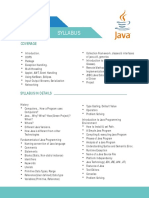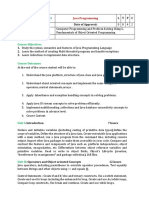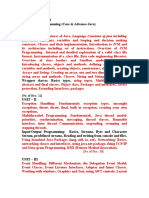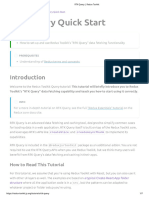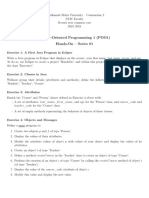0 ratings0% found this document useful (0 votes)
0 viewsCore Java
The document outlines a comprehensive syllabus for a Core Java Introduction class, covering topics such as Java programming basics, object-oriented programming concepts, exception handling, and multithreading. It includes practical elements like setting up the Java environment, using IDEs, and developing a final project. Additional resources for further learning are also provided.
Uploaded by
yesudossjCopyright
© © All Rights Reserved
We take content rights seriously. If you suspect this is your content, claim it here.
Available Formats
Download as PDF, TXT or read online on Scribd
0 ratings0% found this document useful (0 votes)
0 viewsCore Java
The document outlines a comprehensive syllabus for a Core Java Introduction class, covering topics such as Java programming basics, object-oriented programming concepts, exception handling, and multithreading. It includes practical elements like setting up the Java environment, using IDEs, and developing a final project. Additional resources for further learning are also provided.
Uploaded by
yesudossjCopyright
© © All Rights Reserved
We take content rights seriously. If you suspect this is your content, claim it here.
Available Formats
Download as PDF, TXT or read online on Scribd
You are on page 1/ 4
o
Core Java Introduction Class Syllabus
Introduction to Java Programming
Overview of Java programming language
History and evolution of Java
Features of Java (platform independence, security, portability)
Java programming environment setup (JDK, IDEs like Eclipse/IntelliJ)
Introduction to Java applications (Console-based programs)
Java Basics and Syntax
Structure of a Java program
Java keywords and identifiers
Data types (primitive and reference types)
Variables and constants
Operators (arithmetic, relational, logical, assignment)
Input and output in Java (Scanner, System.out)
Type casting and conversion
Control Flow and Decision Making
Conditional statements (if, else, else if, switch)
Loops (for, while, do-while)
Jump statements (break, continue, return)
Methods in Java
Defining methods
Method parameters and return types
Method overloading
Variable scope and lifetime (local, instance, and class variables)
Recursion in methods
Object-Oriented Programming (OOP) Concepts
Introduction to OOP and its principles (Encapsulation, Inheritance, Polymorphism,
Abstraction)
Classes and objects
Instance variables and methods
Constructors (default, parameterized)
The this keyword
Method overloading and overriding
super keyword
Inheritance
Definition and concept of inheritance
extends keyword
Method overriding
Superclass and subclass relationships
Constructor chaining
Object class and methods like toString(), equals(), hashCode()
Polymorphism
Types of polymorphism (Compile-time vs Run-time)
Method overriding and method overloading
Dynamic method dispatch
Interfaces in Java
Abstract classes vs Interfaces
The instanceof operator
Exception Handling
Introduction to exceptions
Types of exceptions (Checked vs Unchecked exceptions)
try, catch, finally blocks
Throwing exceptions (throw and throws)
Custom exceptions (creating user-defined exceptions)
Java Collections Framework
Overview of collections
List, Set, Map interfaces and their implementations
Iterators
Sorting collections
ArrayList, HashMap, HashSet, LinkedList, TreeMap, etc.
String Handling in Java
String class and methods
StringBuilder and StringBuffer
String manipulation techniques (substring, concatenation, comparison)
Regular Expressions in Java
File Handling in Java
Reading and writing files (FileReader, FileWriter, BufferedReader, BufferedWriter)
Working with file streams (FileInputStream, FileOutputStream)
Serialization and Deserialization
Multithreading
Basics of multithreading
Thread class and Runnable interface
Thread life cycle
Synchronization (synchronized keyword)
Thread communication (wait(), notify(), notifyAll())
Java APIs and Libraries
Commonly used Java libraries (Math, Date/Time API, Java I/O)
Working with Java packages
Using built-in utility classes (Arrays, Collections, etc.)
Java Development Tools
Working with IDEs (Eclipse/IntelliJ IDEA)
Using JUnit for Unit Testing
Building and packaging Java applications (JAR files)
Final Project/Capstone
Application of concepts to a final project
Developing a simple console-based or GUI-based application using Java
Code reviews and debugging techniques
Additional Resources:
Recommended textbooks (e.g., Effective Java by Joshua Bloch, Head First Java by Kathy
Sierra)
Online resources like Java documentation, tutorials, and forums
Git and version control basics (optional but recommended for practice)
You might also like
- CORE JAVA Syllabus: 1. Core Java Programming Introduction of JavaNo ratings yetCORE JAVA Syllabus: 1. Core Java Programming Introduction of Java9 pages
- Java Learning Roadmap For Beginners - KabiroskyNo ratings yetJava Learning Roadmap For Beginners - Kabirosky6 pages
- Core Java Syllabus: No. Details To Be CoveredNo ratings yetCore Java Syllabus: No. Details To Be Covered3 pages
- Introduction To Java Programming LanguageNo ratings yetIntroduction To Java Programming Language2 pages
- Croma Campus - Core Java Training CurriculumNo ratings yetCroma Campus - Core Java Training Curriculum8 pages
- Object-Oriented Programming Through JavaNo ratings yetObject-Oriented Programming Through Java12 pages
- Online Core Java Training - Java Core Online Training in USA, Uk, Canada, Australia, Dubai, IndiaNo ratings yetOnline Core Java Training - Java Core Online Training in USA, Uk, Canada, Australia, Dubai, India8 pages
- Java-J2Ee: Object-Oriented Programming (OOPS) ConceptsNo ratings yetJava-J2Ee: Object-Oriented Programming (OOPS) Concepts12 pages
- Object Oriented Programming Through JavaNo ratings yetObject Oriented Programming Through Java131 pages
- Practical 02 Periods Per Week (Each 60 Min) Tutorial - Hours Marks Theory 3 100 Practical 3 25 Oral - Term Work - 25 Evaluation SystemNo ratings yetPractical 02 Periods Per Week (Each 60 Min) Tutorial - Hours Marks Theory 3 100 Practical 3 25 Oral - Term Work - 25 Evaluation System4 pages
- Java Basics-Curriculum: Școala Informală de ITNo ratings yetJava Basics-Curriculum: Școala Informală de IT9 pages
- OOPJ_R23_II-I_MicroSylllabusFinalModelPaperNo ratings yetOOPJ_R23_II-I_MicroSylllabusFinalModelPaper8 pages
- Object Oriented Programming Concepts Using JavaNo ratings yetObject Oriented Programming Concepts Using Java2 pages
- Virtual Sequence & Virtual Sequencer (SOC or Subsystem Level)No ratings yetVirtual Sequence & Virtual Sequencer (SOC or Subsystem Level)12 pages

























